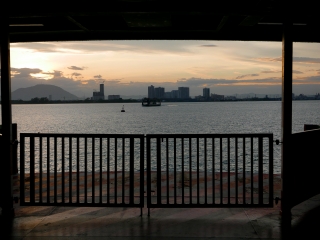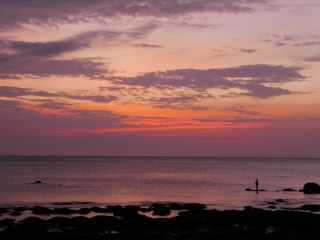On the way to Kuala Lumpur, I saw from the plane an island whose shape intrigued me: a big chunk of jungle with three-four long but narrow patches of white beach. I decided right then and there that I would visit it. The island turned out to be Koh Tarutao (“island” Tarutao) and it was located in Thailand quite close to the border with Malaysia. Since I had 0 plans for my itinerary in Thailand, it was a perfect first destination.
Tarutao is no travel brochure material; on the contrary, it may be the black sheep of the Andaman Sea islands: unlike its very glamorous and much more popular neighbors, it is state owned and has the statute of a nature reserve, which means the dreams of many a business investor died before even reaching the shore of Tarutao. The island is just untouched nature, as far as the eye can see: thick jungle, waterfalls, limestone cliffs, mangroves, wild beaches, small caves, and all the birds and animals that come along. The minimal infrastructure covers the basic needs of a natural park—spartan, unobtrusive, environmentally-friendly: a pier, a ranger’s office, a small info center, one shop, three campsites spread out on 15km, each with its own simple restaurant and a handful of basic bungalows. A clear anomaly when it comes to Thai islands, nowadays sadly synonymous with long strings of restaurants, fancy resorts, go-go bars, or full-moon parties. In fact, boats to the nearby & very famous Koh Lipe sometimes make an unannounced halt on Tarutao and groggy tourists who think they have arrived on Koh Lipe remain perplexed at the pier, probably wondering where the party’s at.

To reach Tarutao, I leave from the uninteresting port of Pak Bara. Like the rest of the deep south of Thailand, it is a town with a significant Muslim population, whose very caring, almost parental behavior more than compensates for the dullness of the place. (The disorientation of my first hours in Thailand quickly dissolved thanks to three ladies who, at different moments, intuited what I needed help with and jumped in to offer it. None of them spoke English.) After a bumpy ride on the Andaman Sea, I reach the Tarutao pier—only a handful of people dot the landscape. A ranger welcomes me and shows me the options for accommodation (there’s no pre-booking procedure). I rent a bungalow on the middle beach, Ao Molae, and another ranger gives me a ride in a truck—a half concrete, half unpaved road pierces the jungle and connects the island’s main parts; it is a legacy from another era.
When we reach Ao Molae, an infinite turquoise sea peeks from behind the perfectly vertical, neatly ordered trunks of a coconut tree plantation. I leave my things in the bungalow (where I also say hello to the usual neighbors, ants and geckos), and go sit on a log on the beach. In front of me: an unobstructed view of the sea, so grand that I wish for a dragonfly’s field of vision to take it all in; behind: an adventure scene, as the local clan of monkeys raids the trash bins of the entire camp for food. Evening comes and I am still on my log, watching human silhouettes profiling like shadow puppets against the sunset. At night, the bioluminescent algae and the dim lights of distant ships make it difficult to leave for bed. As if entranced, I return to my log before dawn, and witness the pink-tinted transition from darkness to light, set against the minimalistic soundtrack of the waves. Then yesterday’s images unfold all over again. And I watch them with the same awe. This must be the greatest cinema that has ever existed.

I forget how many days I spent on Tarutao. The other visitors, whose faces I saw over and over again, as this is not the sort of place for an overnight stay, often had conversations about losing track of time while on the island. It wasn’t boasting, but the sort of state that witnessing the grandiosity of nature every single day, without any distractions, brings you to. Seeing such mechanisms at work—colossal, infallible, unaware of their own beauty—destabilizes you. And even the proverbial instruments failed to measure time: electricity only runs a couple of hours before bedtime, plugs are in a derelict state, after a while you just don’t bother recharging.
Only two events interrupted my daily nature-watching on Tarutao. First was when I took a 12km bike trip to the other side of the island, where a prison was maintained until 1949. Coming from my version of paradise, I had a hard time understanding how being confined to this island could have been a living hell for someone. But malaria, sharks and crocodiles—which in the meantime have either disappeared or become insignificant threats—or harsh, sadistic punishments by the prison guards were a sure death for many of the prisoners. The bodies were left out in the jungle to rot or be preyed upon by wild animals. Few ruins survive on the prison grounds, and still the whole area has a somber atmosphere; the sea looks darker, the wind blows faster, the waves are stronger. There are rumors that the rangers appointed to this side of the island (normally one per season) struggle to keep their sanity intact.
The other event was being led into a trap by two macaques. While one of them cunningly distracted me from my log, the other ransacked my things for food. Upon return I found a miniature disaster: everything unzipped/unscrewed/unfolded and turned over, money and papers flying all around. Worst of all, the monkey had tampered with my camera, probably mistaking it for a food container. Disappointed with the reality, it had buried it in wet sand after removing the lid. In an instant my whole world turned black. The prospect of a trip without a camera was inconceivable. In the turmoil of this small catastrophe, I somehow put my camera back together and cleaned it. I fiddled with it for the rest of the day, until at some point it resumed working, still coughing up sand. After this incident, I stopped using “cute” and “monkey” in the same sentence.
For many visitors, the Thai experience begins and ends at some beach. The offer is so varied and the possibilities so many, I’ve heard anything from “ecological disaster” to “best time we’ve ever had.” Something too began and ended for me on the Tarutao beach. Except Koh Lanta (which I visited briefly), I didn’t step foot on any of the ‘classic’ Thai islands. It was a representative side of Thailand that I deliberately chose to skip because I had already lived through the experience, already watched the film. And, unplanned as it was, the Tarutao film may have been the greatest possible.












Leave a Reply